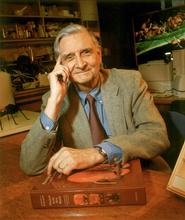
Biologist E.O. Wilson made the case for the protection of biodiversity in a lecture titled “The Creation: An Appeal to Save Life on Earth,” on Monday, Oct. 3. The Biology and Environmental Studies departments brought Wilson to Hamilton for the annual James S. Plant Distinguished Scientist Lecture.
Professor of Biology Ernest Williams introduced Wilson as one of the rare scientists who has significantly altered the direction of scientific thought. Wilson has been acknowledged with two Pulitzer Prizes for general non-fiction. He is now Pellegrino University Professor Emeritus and Honorary Curator in Entomology at Harvard University.
“We have scarcely begun to explore this planet,” said Wilson, beginning his presentation with a glimpse at the world that lies beyond current human understanding. Scientists still have not discovered the vast majority of organisms, especially species of fungi, nematodes and bacteria. Wilson noted mycology, nematology, and microbiology as open fields for Hamilton students seeking their niche. Nematodes, for example, are thought to represent four out of every five species of animals, yet scientists have only discovered 30,000 species out of potential millions. Opportunities in the field abound.
Wilson also emphasized the ubiquitous nature of biodiversity, existing even in areas untouched by sunlight. He explained that if all life above ground were wiped out, Subsurface Lithoautotrophic Microbial Ecosystems (SLiMEs) that use chemical energy from earth’s underground rocks would eventually reach the surface and begin the cycle of life over again.
Despite this ubiquity, certain areas have much more concentrated biodiversity. One tree in the Peruvian rainforest contains 42 species of ants. Lest this number appear unimpressive, Wilson said, it matches the amount of species of ants across the entire United Kingdom. Yet those rainforests lose areas equivalent to half the size of Florida every year. The destruction of natural environments is accelerating, Wilson declared, and it is happening where biodiversity is greatest.
Wilson identified five sources of the destruction of world biodiversity, collecting them in the acronym HIPPO. From the most harmful item to the least harmful item, HIPPO comprises habitat destruction, invasive species, pollution, (over)population and overharvesting of organisms. Habitat destruction includes direct human activity, like the demolition of rainforests for resources, and climate change.
Wilson estimates that if these elements continue at their present rates, half of the current surviving species will perish by the end of the century. To prevent this, Wilson recommends the preservation of “hotspots” like rainforests. Unless such steps are taken, Wilson said, “The loss is going to inflict a heavy price on us in wealth, security, and spirit.”
“I know I’m beginning to sound like an evangelical, and so be it,” Wilson declared. “This is something worth preaching about.” He stated that the central problem of the century is a combination of raising the poor of the world while preserving as much of the natural world as possible. The disadvantaged can use the resources of the natural world to rise out of poverty, but the environment cannot survive the unregulated force of their need. Wilson stressed that we must find a balance. The job will be difficult, but worthwhile. “It’s an ennobling task,” he said.
For some lucky scientists, the job will also be full of excitement. Wilson’s slideshow featured images from exploration and research in the canopies of the rainforest, which his colleagues reach by climbing or by traveling in a gondola hoisted by a giant crane. “This is adventure, big time,” Wilson said happily.
One picture showed a student edging out along a tree branch high above the ground. “That looks dangerous—I guess it is,” Wilson said. “But as we say at Harvard, that’s what grad students are for.”
